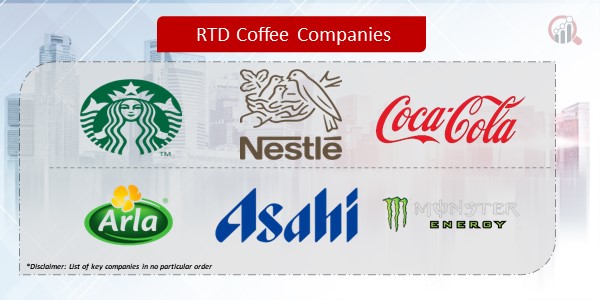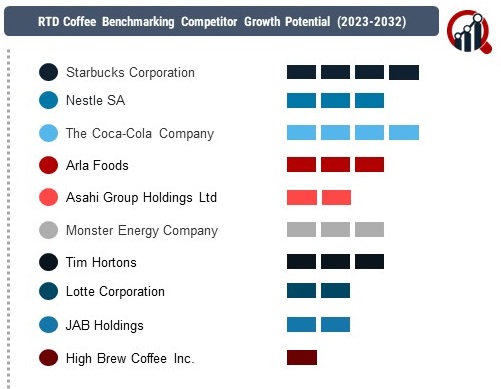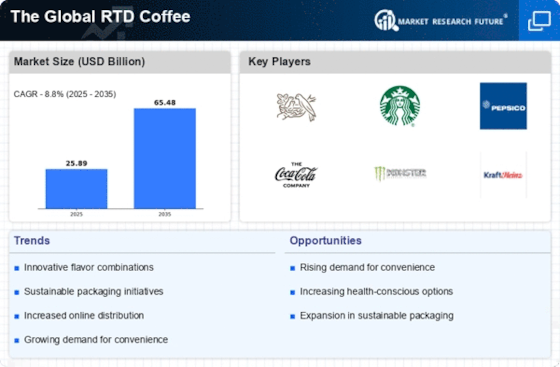Top Industry Leaders in the Rtd Coffee Market

Strategies Adopted by Rtd Coffee Key Players
Competitive Landscape of the RTD Coffee Market
The RTD (ReadytoDrink) coffee market has witnessed intense competition among key players striving to gain a significant share in this rapidly growing segment. As consumers increasingly opt for convenient beverage options, the market has attracted a multitude of players, each employing unique strategies to carve out their niche.
Key Players:
- Starbucks Corporation
- Nestle SA
- The Coca-Cola Company
- Arla Foods
- Asahi Group Holdings Ltd
- Monster Energy Company
- Tim Hortons
- Lotte Corporation
- JAB Holdings
- High Brew Coffee Inc.
Product Innovation: Key players continually introduce new flavors, formulations, and packaging innovations to cater to evolving consumer preferences.
Partnerships and Collaborations: Strategic alliances with coffee chains, distributors, and retailers help expand market reach and enhance brand visibility.
Marketing and Advertising: Aggressive marketing campaigns, celebrity endorsements, and social media engagement are employed to create brand awareness and drive sales.
Expansion into Emerging Markets: Companies are targeting emerging economies with rising disposable incomes and a growing coffee culture to capitalize on untapped market potential.
Factors for Market Share Analysis:
Brand Recognition: Established brands like Nescafé and Starbucks command significant market share due to their strong brand equity and consumer trust.
Distribution Network: Wide distribution networks and partnerships with retailers and foodservice outlets enable companies to reach a larger consumer base.
Product Portfolio: Diverse product portfolios offering various flavors, formulations, and packaging options cater to different consumer preferences and contribute to market share.
Innovation: Companies investing in product innovation and staying abreast of emerging trends gain a competitive edge by meeting evolving consumer demands.
News and Emerging Companies:
Emerging Players: New entrants, particularly startups and niche brands, are disrupting the market with innovative products targeting specific consumer segments, such as cold brews, nitro coffees, and functional beverages.
Mergers and Acquisitions: Consolidation in the industry continues as companies seek to expand their product portfolios, geographic presence, and market share through strategic acquisitions.
Investment Trends: Venture capital investment in RTD coffee startups and emerging companies is on the rise, reflecting investor confidence in the market's growth potential.
Industry News and Current Company Investment Trends:
Sustainability Initiatives: Companies are increasingly focusing on sustainability, with initiatives such as sourcing ethically grown coffee beans, using ecofriendly packaging, and reducing carbon footprint throughout the supply chain.
Health and Wellness Trends: With growing consumer awareness of health and wellness, there's a shift towards healthier RTD coffee options, including lowsugar, lowcalorie, and functional beverages with added vitamins, antioxidants, and plantbased ingredients.
Technology Integration: Adoption of technology, such as online sales platforms, mobile apps for ordering and delivery, and smart vending machines, is enhancing consumer convenience and driving sales growth.
Overall Competitive Scenario:
The competitive landscape of the RTD coffee market is characterized by intense rivalry among key players vying for market dominance. While established brands leverage their strong market presence and distribution networks, emerging companies disrupt the market with innovative products and strategies. With consumers' increasing demand for convenience, healthconscious options, and flavor diversity, companies must continuously innovate and adapt to stay competitive in this dynamic market.
Recent Developments in 2023:
In 2023, the RTD coffee market witnessed several notable developments:
Nestlé introduced new flavors and variants under its Nescafé brand, catering to diverse consumer preferences and expanding its product portfolio.
CocaCola announced strategic partnerships with leading coffee chains to strengthen its presence in the outofhome RTD coffee segment.
PepsiCo launched a marketing campaign highlighting the sustainability initiatives undertaken in its RTD coffee supply chain, resonating with environmentally conscious consumers.
Asahi Group made further investments in marketing and distribution channels to promote its premium RTD coffee offerings and capture market share from competitors.
Danone introduced organic and plantbased RTD coffee products under its Silk and Oikos brands, capitalizing on the growing demand for healthier beverage options.
These developments underscore the dynamic nature of the RTD coffee market, characterized by continuous innovation, strategic collaborations, and a focus on meeting evolving consumer preferences.











